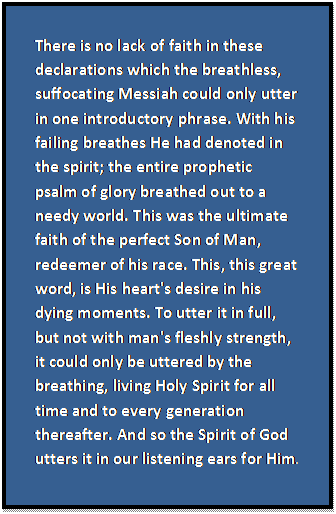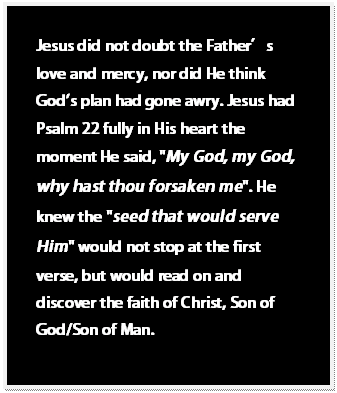Presumption is not Faith
by Eloise Gardenier
About two m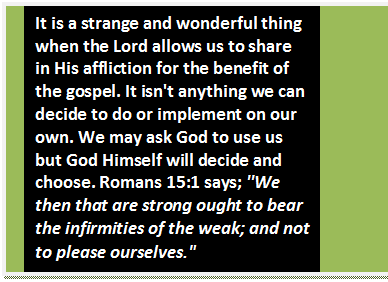 onths after I was born-again and filled with the Spirit, I began to see and believe that God not only had the power, but would actually heal our bodies at times. Prior to that the only faith I had for any kind of healing was by the medical profession.
onths after I was born-again and filled with the Spirit, I began to see and believe that God not only had the power, but would actually heal our bodies at times. Prior to that the only faith I had for any kind of healing was by the medical profession.
To build my faith in His power God poured out his mercy upon me by making me the recipient of His love. When I was about five months old in Him I went back to my former home to attend a huge meeting at Notre Dame Stadium in South Bend, Indiana. I had suffered from a rheumatic heart murmur since childhood. Over the years I had experienced much emotional heartbreak and a lot of it took place right there in South Bend. As thousands sang to Jesus, I felt intense heat in my heart and chest, like nothing I had ever known before. It was beyond description. No doctor has ever been able to hear that murmur since, including my present doctor, whom I asked to check it as a confirmation. The healing took place twenty years ago. I can only ask you to take my word for it that my broken heart was also healed. Those who knew me before will attest to that.
The Lord also healed a cyst on my hand that had been operated on, returned, then drained, and returned again. I had prayed for my cat's eczema and the Lord healed the cyst as well. We were both healed in a week's time. I didn't ask for anything for myself, nor did I ask or demand to be healed in South Bend. I was so high and happy on the Lord, I wasn't thinking of my needs or that I even had any. I know that both of those things were pure gifts of God's loving mercy for me, although I had done nothing to earn or deserve it except to come to His Son. I share these two blessings to establish that I most certainly do believe; in fact, have great faith for the literal healing power of my God. Our family has been visited by His supernatural healing many times. This was done by His will, not by the sheer will of our faith or upon our demand.
The enemy of our souls wasted no time in trying to ruin the faith God was building in me for His healing. As a new born Christian, filled with enthusiasm for the gifts of God, I wanted everything I could get, and this included teachings of God's Word. Even though I was forty-seven years old, I was a baby, and my zeal made me naive enough to believe almost anything I was told by those who had known the Lord longer than I. One of which was a man who happened to be much younger than me in years, but who had known the Lord quite a bit longer. He certainly knew the Word enough to preach the gospel convincingly. However, he did injure me in the area of physical healing and set me back for some time to come.
I had been having some nagging health problems and he heard that I was ill, and came to my house, unannounced, to see to it that I was healed. At that time he was being schooled by one or more "positive confession" groups. That evening our friend employed the "God said it, I believe it, that settles it" practice. He left telling me that I was healed. All I had to do was claim it and have faith. The bottom line was; I was not healed and now I felt guilty because it didn't happen. I felt it was my fault because my faith was too weak, so I was sicker now than I was before he came. What faith I had already been given through my other healings was greatly damaged for some time.
Presumption can get us in trouble
After a couple of years a small booklet was put in our hands called Faith or Presumption by Dr. Charles Farah. The way Dr. Farah rightly divided the Word of God and gave personal accounts of his own experiences showed me there was a great difference between faith and presumption. He taught: "I think that if we do just a little study, two Greek words for the word "Word" will help us to understand. One is the word Rayma, the other is the word Logos. The logos is universal Jesus Christ, the universal Lord of the earth, sky and seas whether anyone believes that or not. Jesus Christ is the eternal Word of God. But the Rayma is subjective; it's God's word to you." He goes on to explain that the Bible is the Logos and the promises of healing are general, not specific, and one must receive Rayma or a personal word from God for a specific healing. Dr. Farah also says;
"Bad theology is a cruel taskmaster. He flogs and beats those who fall into his possession as surely as physical sickness or the torture cages of Vietnam. Many people have been destroyed by a few words of bad theology. Bad theology says, in essence, If the facts don't fit the case, then stretch them until they fit. If there are more facts than the case allows cut off the excess facts.
"There are wrecked lives left all over the Spirit filled community because people have been victims of bad theology. Bad theology says miracles cannot occur in this day. They ceased with the first century. Bad theology says a Christian cannot be bothered by the enemy because the enemy is off limits for him. Bad theology says everyone who is prayed for must be healed since the only condition is faith. Bad theology is presumptuous and there is a thin hairline between bold faith and bad presumption."
Praise God! Beware of presumption. God eventually healed me from the wound I suffered from that bad theology and turned it around because I was not willing to settle for anything short of the truth. I truly wanted a deep walk with Him, including all the bearing of burdens, tribulation, persecutions, and sharing of His sufferings, as well as all the benefits and promises.
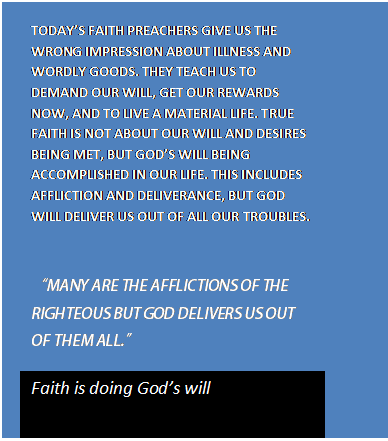 I spoke with a friend recently who was a member of a "positive confession" church for some years and she described their teachings in this way; God is a giver of gifts - all loving, all forgiving, never brings judgment. The members must never admit anything is wrong; they must not give a "negative confession". She said she didn't know who God really is. There was no balance of sound doctrine. They appeared disinterested in the real truth or true faith.
I spoke with a friend recently who was a member of a "positive confession" church for some years and she described their teachings in this way; God is a giver of gifts - all loving, all forgiving, never brings judgment. The members must never admit anything is wrong; they must not give a "negative confession". She said she didn't know who God really is. There was no balance of sound doctrine. They appeared disinterested in the real truth or true faith.
Example of Infirmities
I believe God allows us to bear physical infirmities for His purposes. The following are a few examples of this:
1.) To teach us.
The story of Lazarus being raised Jn 11 is an example of God using affliction even unto death so that we might learn of heavenly things. Jesus said; "Lazarus is dead. And I am glad for your sakes that I was not there, to the intent ye may believe; nevertheless let us go unto him." " .. .And when He thus had spoken, He cried with a loud voice, Lazarus, come forth. He that was dead came forth,... " "Then many of the Jews which came to Mary, and had seen the things which Jesus did, believed on Him."
2.) To chasten and test us.
Job is the most perfect example of both reasons. There is a lot more to Job's story than boils and patience. "And the Lord said unto Satan, Behold, he is in thine hand; but save his life." God did allow Job to be tested, in many ways he was found righteous. It was because of these trials, along with the exposure of his self-righteousness (not the righteousness of God) that he was able to come to the end of himself, repent and come to know God in a personal way, not just by the hearing of the ear or hearsay; but know Him face to face. The same is true of us before we come to know our Savior and have new lives as Job did. When Job prayed for his friends he was set free, and the Lord blessed him more than his beginning. So that our faith in a given area may be strengthened, we may be tested. Do yourself a favor and read the entire book of Job!
3.) The prophets were used as examples.
God had many of the prophets afflicted in strange and frightening ways in order to demonstrate certain things for all who would come after them. Some became so ill from depression and felt so hopeless they even asked God to kill them. Moses' burden of the ungrateful ones in his charge was so great at one point he did ask God to kill him. (Numbers 11:15) But God personally buried him when he died. Other prophets of God joined Moses in this plea for death. Elijah, after killing the prophets of Baal, ran for his life from Jezebel and asked God to let him die. He was allowed to go out in a blaze of glory, caught up to heaven in a chariot of fire, never having to see death. (A type of the rapture) 2 Kings, Ch 2
4.) To intercede for others.
In the New Testament Paul is ou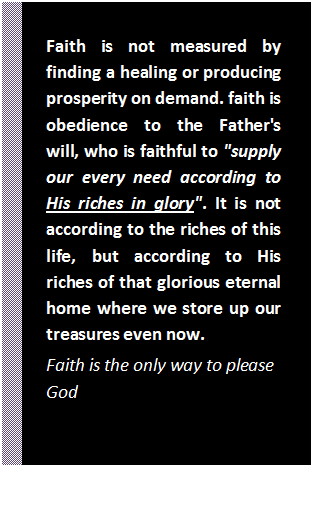 r prime example of one who suffered for those of his day and the gospel's sake, but also as a testimony left for all of us to live by. His willingness to suffer these things for the brethren and the gospel gives us a shinning pattern for our own Christian walk. Read 2 Corinthians 11:23-33. In 2 Corinthians 12:10 Paul encourages us in this way; "Therefore I take pleasure in infirmities, in reproaches, in necessities, in persecutions, in distresses for Christ's sake: for when I am weak, then am I strong." Paul wrote to the Thessalonians, "For our gospel came not unto you in word only, but also in power, and in the Holy Ghost, and in much assurance; as ye know what manner of men we were among you for your sake. And ye became followers of us, and of the Lord, having received the word in much affliction, with joy of the Holy Ghost; so that ye were examples to all that believe in Macedonia and Achaia."
r prime example of one who suffered for those of his day and the gospel's sake, but also as a testimony left for all of us to live by. His willingness to suffer these things for the brethren and the gospel gives us a shinning pattern for our own Christian walk. Read 2 Corinthians 11:23-33. In 2 Corinthians 12:10 Paul encourages us in this way; "Therefore I take pleasure in infirmities, in reproaches, in necessities, in persecutions, in distresses for Christ's sake: for when I am weak, then am I strong." Paul wrote to the Thessalonians, "For our gospel came not unto you in word only, but also in power, and in the Holy Ghost, and in much assurance; as ye know what manner of men we were among you for your sake. And ye became followers of us, and of the Lord, having received the word in much affliction, with joy of the Holy Ghost; so that ye were examples to all that believe in Macedonia and Achaia."
5.) To make us weak so that He might be strong in us.
Afflicted For The Gospel's Sake
It is a strange and wonderful thing when the Lord allows us to share in His affliction for the benefit of the gospel. It isn't anything we can decide to do or implement on our own. We may ask God to use us but God Himself will decide and choose. Romans 15:1 says; ''We then that are strong ought to bear the infirmities of the weak; and not to please ourselves." Asceticism pleases the flesh and one may draw improper satisfaction from being a "martyr" or having pride in one's own works. This is not the kind of bearing of another's burden I am talking about. When God chooses to use our bodies for the sake of others the workings of it are truly a mystery.
The most dramatic example of this that I know of personally is my own husband. From January 1986, when he was diagnosed with cancer, until March 1987, when he returned to work he had two operations and 30 days of radiation treatment. All the while both he and I were sharing our testimonies with his surgeon. We were living examples to him of our faith, we trusted our God no matter what the outcome would be. The only scripture the Lord gave me during that time was Romans 8:28, "All things work together for good to those that love God and are called according to His purposes”. I shared this with the Dr. and made it clear that I was standing on that, because God had given it to me personally (Rayma). After it was allover and my husband was given a clean bill of health the doctor received Jesus Christ as his Savior. He shared with us that he knew Roy's body was used to bring him to salvation. "So then death worketh in us, but life in you." (2 Corinthians 4:12) I must add, the doctor confessed later that he didn't think Roy would live to the second operation. This is typical of God's irony that the patient healed the doctor.
We have matured in our constant search for the truth; we have sought the full counsel of God through His Word, and by the Holy Ghost. Having desired to make the prophets of God our examples, and looking to some of the true saints of God throughout the church age to teach us, we have found many reasons for God to allow affliction upon His people.
We should pray for one another's infirmities, knowing, however, that the Spirit of God always has the final say. It doesn't necessarily depend on how strong or weak our faith is. God can't be ordered, coerced or blackmailed into healing us because we claim it. It is His mercy, and we know that His ways are not our ways as acted out through my husband's cancer ordeal. Death worked in the vessel of God so that life could work in the lost soul.
Faith is not measured by finding a healing or producing prosperity on demand; faith is obedience to the Father's will, who is faithful to "supply our every need according to His riches in glory". It is not according to the riches of this life, but according to His riches of that glorious eternal home where we store up our treasures even now.
THE JOURNEY
TO BRIDESHIP
THE ADVENTURE BEGINS:
1.) What is a Christian?
2.) Nativity: New birth/creation.
3.) Believers get a new heritage
4.) Rahab; Story of salvation
5.) The Day the King's son died
6.) Three Little Words and I knew
TOWARD BEING:
THE FUNDAMENTALS
OF CHRIST
1) Repentance from dead works
2) Faith towards God
3) Doctrine of baptisms
4) Laying on of hands
5) Eternal judgment
6) Resurrection of the dead
SEVEN PILLARS OF KNOWLEDGE
PURIFIED PERFECT
1. WALKING IN THE SPIRIT
2. ADD TO YOUR FAITH:
1) Virtue
2) Knowledge
3) Patience
4) Temperance
5) Godliness
6) Brotherly Kindness
7) Love
PREPARED - PERFECT
1.) PROVING THE BRIDE IS
2.) GOD'S QUEST FOR BRIDE
3.) Perfectly Prepared and Ready
4.)
True Religion
5.) Overcoming
6.) Waiting
THE BIG DAY: THE RAPTURE
